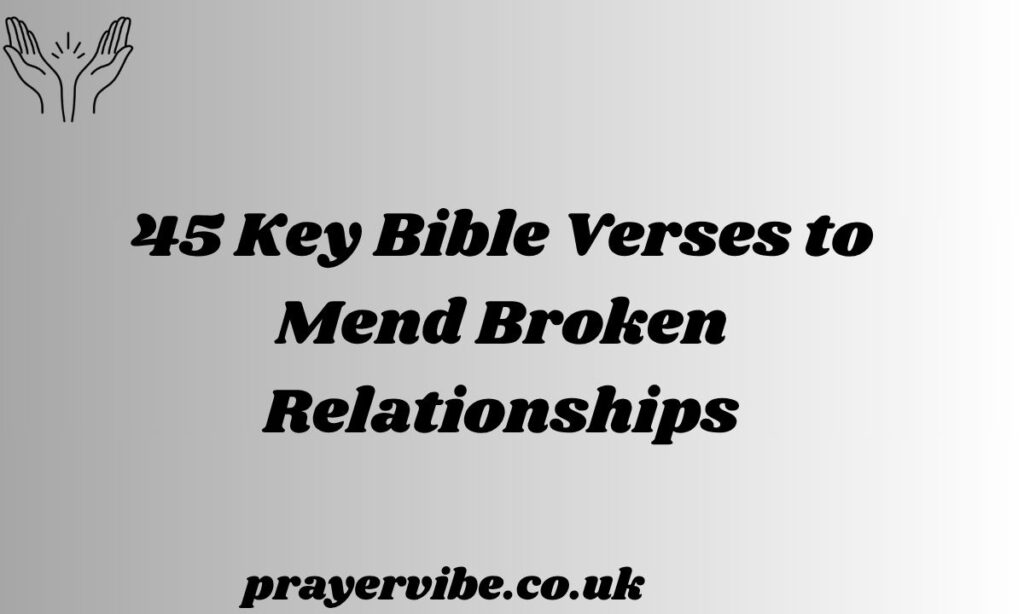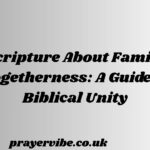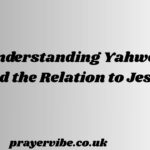Relationships are the beautiful tapestry of our lives, intricately woven with threads of love, trust, and understanding. In the Christian journey, these connections reflect God’s divine plan for community and fellowship among His people.
🙏 The Bible, our eternal source of wisdom, offers profound guidance on healing the broken edges of our relationships. Scripture illuminates our path through the complex landscape of human connections.
These sacred texts teach us to forgive completely, love unconditionally, and work diligently toward reconciliation, mirroring Christ’s own ministry of restoration. ✝️
🙏 Divine Prayer Generator
Select a prayer category to begin
Understanding Forgiveness 🕊️
Forgiveness is the foundation upon which all healed relationships are built. It’s a conscious choice, exemplified perfectly by Jesus Christ, that liberates both the forgiver and the forgiven from the prison of resentment.
The Bible presents forgiveness not as optional but essential for Christian living, reminding us that we have received immeasurable forgiveness from our Heavenly Father.
Colossians 3:13 (NIV): “Bear with each other and forgive one another if any of you has a grievance against someone. Forgive as the Lord forgave you.” This powerful instruction reminds us to measure our forgiveness by the boundless forgiveness we’ve received from God.
Ephesians 4:32 (NIV): “Be kind and compassionate to one another, forgiving each other, just as in Christ God forgave you.” Here, kindness and compassion intertwine with forgiveness, creating a healing balm for wounded relationships.
Matthew 6:14-15 (NIV): “For if you forgive other people when they sin against you, your heavenly Father will also forgive you. But if you do not forgive others their sins, your Father will not forgive your sins.” These words from Jesus highlight the reciprocal nature of forgiveness in our spiritual journey.
The Power of Patience and Kindness ❤️
Patience and kindness are divine virtues that dissolve conflict and nurture healing in fractured relationships. They serve as cooling waters to the fires of anger and misunderstanding.
Scripture overflows with counsel encouraging these gentle traits in our daily interactions.
Proverbs 15:1 (NIV): “A gentle answer turns away wrath, but a harsh word stirs up anger.” This wisdom captures how our tone and approach can either escalate or defuse tension.
1 Corinthians 13:4-5 (NIV): “Love is patient, love is kind. It does not envy, it does not boast, it is not proud. It does not dishonor others, it is not self-seeking, it is not easily angered, it keeps no record of wrongs.” This beautiful description of love provides a blueprint for healing relationships.
Galatians 5:22-23 (NIV): “But the fruit of the Spirit is love, joy, peace, forbearance, kindness, goodness, faithfulness, gentleness and self-control. Against such things there is no law.” These spiritual fruits naturally foster relationship restoration when cultivated.
Communicating with Love and Respect 💬
Effective communication forms the lifeline of every relationship. Through our words and body language, we convey our thoughts, feelings, and intentions. When relationships strain, how we communicate can either bridge or widen the gap.
James 1:19 (NIV): “My dear brothers and sisters, take note of this: Everyone should be quick to listen, slow to speak and slow to become angry.” This verse captures the essence of respectful dialogue—prioritizing understanding before responding.
Ephesians 4:29 (NIV): “Do not let any unwholesome talk come out of your mouths, but only what is helpful for building others up according to their needs, that it may benefit those who listen.” Our words should heal and build, not tear down.
Proverbs 18:13 (NIV): “To answer before listening—that is folly and shame.” This wisdom reminds us that true communication begins with genuine listening.
Seeking and Offering Repentance 🙌
The journey toward relationship restoration often requires sincere repentance. True repentance involves acknowledging wrongdoing, offering a heartfelt apology, and committing to behavioral change.
In Christian understanding, repentance is transformative—aligning us with God’s will and opening doors to reconciliation.
Acts 3:19 (NIV): “Repent, then, and turn to God, so that your sins may be wiped out, that times of refreshing may come from the Lord.” This verse highlights how repentance brings spiritual renewal, which can extend to our relationships.
1 John 1:9 (NIV): “If we confess our sins, he is faithful and just and will forgive us our sins and purify us from all unrighteousness.” God’s faithful forgiveness models how we should respond to sincere repentance.
Luke 17:3-4 (NIV): “So watch yourselves. If your brother or sister sins against you, rebuke them; and if they repent, forgive them. Even if they sin against you seven times in a day and seven times come back to you saying ‘I repent,’ you must forgive them.” Jesus sets a high standard for our readiness to forgive repeated offenses.
Embracing Humility in Relationships 🌱

Humility serves as a healing balm in relationships where pride has created division. It involves recognizing our own imperfections and valuing others above ourselves. Scripture teaches that humility reflects strength, not weakness, and fosters unity and mutual understanding.
Philippians 2:3-4 (NIV): “Do nothing out of selfish ambition or vain conceit. Rather, in humility value others above yourselves, not looking to your own interests but each of you to the interests of the others.” This powerful instruction reorients our focus from self to others.
1 Peter 5:5 (NIV): “All of you, clothe yourselves with humility toward one another, because, ‘God opposes the proud but shows favor to the humble.'” This verse uses the metaphor of clothing ourselves in humility—making it visible in all our interactions.
Proverbs 11:2 (NIV): “When pride comes, then comes disgrace, but with humility comes wisdom.” Pride often precedes relationship breakdown, while humility fosters the wisdom needed for repair.
Trust and Rebuilding Trust 🤝
Trust forms the bedrock of every meaningful relationship, and when broken, rebuilding it requires intentional effort and time. The Bible offers guidance on restoring trust through consistent and honorable actions.
Psalm 15:4 (NIV): “…who keeps an oath even when it hurts, and does not change their mind.” This describes someone who values integrity above personal comfort—a key quality in rebuilding trust.
Proverbs 11:13 (NIV): “A gossip betrays confidence, but a trustworthy person keeps a secret.” Our handling of sensitive information demonstrates our trustworthiness.
Proverbs 25:19 (NIV): “Like a broken tooth or a lame foot is reliance on the unfaithful in a time of trouble.” This vivid imagery reminds us how painful broken trust can be—motivating us to be people of our word.
Overcoming Bitterness and Resentment 🍃
Bitterness and resentment can poison our hearts and damage our relationships. These negative emotions often stem from unhealed wounds, but Scripture guides us to release these feelings and embrace healing and freedom.
Hebrews 12:15 (NIV): “See to it that no one falls short of the grace of God and that no bitter root grows up to cause trouble and defile many.” This verse uses the metaphor of a bitter root spreading and affecting many relationships.
Ephesians 4:31-32 (NIV): “Get rid of all bitterness, rage and anger, brawling and slander, along with every form of malice. Be kind and compassionate to one another, forgiving each other, just as in Christ God forgave you.” This passage calls for active removal of negative emotions and their replacement with positive virtues.
Romans 12:19 (NIV): “Do not take revenge, my dear friends, but leave room for God’s wrath, for it is written: ‘It is mine to avenge; I will repay,’ says the Lord.” Releasing our right to vengeance frees us from the burden of bitterness.
The Role of Prayer in Healing Relationships 🙏
Prayer serves as a powerful catalyst for healing broken relationships. Through prayer, we invite God’s wisdom, strength, and healing into our situations and align our hearts with His perfect will.
Matthew 5:44 (NIV): “But I tell you, love your enemies and pray for those who persecute you.” Jesus challenges us to pray even for those who have hurt us deeply—a transformative practice.
Philippians 4:6-7 (NIV): “Do not be anxious about anything, but in every situation, by prayer and petition, with thanksgiving, present your requests to God. And the peace of God, which transcends all understanding, will guard your hearts and your minds in Christ Jesus.” Prayer brings peace to troubled relationships.
James 5:16 (NIV): “Therefore confess your sins to each other and pray for each other so that you may be healed. The prayer of a righteous person is powerful and effective.” This verse connects confession, prayer, and healing in relationships.
Examples of Reconciliation in the Bible 📚
The Bible contains powerful narratives of reconciliation that provide hope and guidance for our own relationship struggles. These stories showcase God’s redemptive work in human relationships.
Genesis 45:1-15: Joseph’s reconciliation with his brothers who sold him into slavery demonstrates extraordinary forgiveness and God’s sovereign plan working through painful circumstances.
Luke 15:11-32: The Prodigal Son parable illustrates a father’s unconditional love and forgiveness toward his wayward son, modeling God’s heart toward His children.
2 Samuel 14:33: Absalom’s reconciliation with his father King David after a period of estrangement shows how intermediaries can help facilitate healing between parties.
Taking Practical Steps Toward Reconciliation 👣
While Scripture provides spiritual principles for mending relationships, it also offers practical guidance we can apply in our reconciliation efforts.
Matthew 5:23-24 (NIV): “Therefore, if you are offering your gift at the altar and there remember that your brother or sister has something against you, leave your gift there in front of the altar. First go and be reconciled to them; then come and offer your gift.” Jesus teaches that reconciliation should take priority even over religious duties.
Galatians 6:1 (NIV): “Brothers and sisters, if someone is caught in a sin, you who live by the Spirit should restore that person gently.” This verse emphasizes the importance of a gentle approach when addressing issues that have caused relationship damage.
Matthew 18:15-17 (NIV) outlines a clear process for conflict resolution, beginning with private conversation and progressing to involving others only as needed—providing a practical framework for addressing relationship problems.
Cultivating a Forgiving Community 🌿
Healing relationships flourish within supportive communities that value forgiveness and reconciliation. The New Testament frequently describes the church as a body of believers called to encourage and support one another.
1 Thessalonians 5:11 (NIV): “Therefore encourage one another and build each other up, just as in fact you are doing.” Encouragement creates an atmosphere where reconciliation can thrive.
Romans 12:16 (NIV): “Live in harmony with one another. Do not be proud, but be willing to associate with people of low position. Do not be conceited.” Harmony requires humility and inclusion.
Hebrews 10:24-25 (NIV): “And let us consider how we may spur one another on toward love and good deeds, not giving up meeting together, as some are in the habit of doing, but encouraging one another—and all the more as you see the Day approaching.” Regular fellowship strengthens relationships and provides accountability.
Seek Guidance from Church Leaders 👴
In complex relationship situations, seeking wise counsel from spiritual leaders can provide invaluable guidance and perspective.
Proverbs 19:20 (NIV): “Listen to advice and accept discipline, and at the end you will be counted among the wise.” This verse highlights the wisdom of seeking and heeding good counsel.
Hebrews 13:17 (NIV): “Have confidence in your leaders and submit to their authority, because they keep watch over you as those who must give an account.” Church leaders carry responsibility for spiritual care and can offer direction in relationship matters.
Proverbs 15:22 (NIV): “Plans fail for lack of counsel, but with many advisers they succeed.” Multiple perspectives can illuminate blind spots in our approach to reconciliation.
Navigating Ongoing Conflicts with Grace ✨
Even with our best efforts, some conflicts may persist. Scripture offers wisdom for maintaining grace and integrity during prolonged relationship challenges.
Romans 12:18 (NIV): “If it is possible, as far as it depends on you, live at peace with everyone.” This verse acknowledges that peace isn’t always attainable but encourages us to do our part.
Proverbs 20:3 (NIV): “It is to one’s honor to avoid strife, but every fool is quick to quarrel.” Wisdom includes knowing when to engage and when to step back from conflict.
Ephesians 4:2-3 (NIV): “Be completely humble and gentle; be patient, bearing with one another in love. Make every effort to keep the unity of the Spirit through the bond of peace.” These verses call for patience and continuous effort toward unity.
Letting Go and Moving Forward 🕊️

Sometimes, despite genuine efforts, reconciliation remains elusive. In such cases, Scripture guides us on how to release the relationship and move forward in faith.
Philippians 3:13-14 (NIV): “Brothers and sisters, I do not consider myself yet to have taken hold of it. But one thing I do: Forgetting what is behind and straining toward what is ahead, I press on toward the goal to win the prize for which God has called me heavenward in Christ Jesus.” Paul’s example teaches us to focus forward rather than dwelling on past hurts.
Romans 8:28 (NIV): “And we know that in all things God works for the good of those who love him, who have been called according to his purpose.” This promise reassures us that God can bring good from painful relationship endings.
Isaiah 43:18-19 (NIV): “Forget the former things; do not dwell on the past. See, I am doing a new thing! Now it springs up; do you not perceive it? I am making a way in the wilderness and streams in the wasteland.” God specializes in new beginnings after painful endings.
Encouraging Verses for Difficult Times in Relationships ⭐
During relationship challenges, God’s Word offers comfort, strength, and hope. Here are additional verses to sustain you through difficult seasons:
Psalm 46:1 (NIV): “God is our refuge and strength, an ever-present help in trouble.”
Isaiah 41:10 (NIV): “So do not fear, for I am with you; do not be dismayed, for I am your God. I will strengthen you and help you; I will uphold you with my righteous right hand.” Show Image
2 Corinthians 12:9 (NIV): “But he said to me, ‘My grace is sufficient for you, for my power is made perfect in weakness.'” Show Image
Joshua 1:9 (NIV): “Have I not commanded you? Be strong and courageous. Do not be afraid; do not be discouraged, for the LORD your God will be with you wherever you go.”
Psalm 34:18 (NIV): “The LORD is close to the brokenhearted and saves those who are crushed in spirit.”
John 16:33 (NIV): “I have told you these things, so that in me you may have peace. In this world you will have trouble. But take heart! I have overcome the world.”
Conclusion
The journey of repairing relationships requires patience, humility, and faithful application of biblical principles. By integrating these 45 verses into our approach to broken relationships, we can navigate the path toward healing with divine wisdom as our guide.
Faith and Scripture provide the roadmap for mending broken bonds and nurturing loving, healthy connections with those around us. Remember that relationship restoration often takes time, but with God’s help, healing is possible.
Prayer 🙏
Heavenly Father,
We come before You with hearts that desire healing and restoration in our damaged relationships. Guide us with Your wisdom as we apply the truths from Your Word to mend the broken connections in our lives.
Teach us to forgive as completely as You have forgiven us, to love with the sacrificial love of Christ, and to extend grace even when it’s difficult.
May these verses become more than words on a page—may they transform our hearts and actions as we seek reconciliation.
Give us patience for the journey, wisdom for difficult conversations, and hope when progress seems slow.
In every interaction, let us reflect Your heart and Your ways.
In Jesus’ name, Amen.
Frequently Asked Questions
What does the Bible say about mending broken relationships?
The Bible emphasizes forgiveness, patience, humility, and reconciliation as God’s design for healing relationships.
Are there specific Bible verses for healing marriages?
Ephesians 5:21-33, 1 Corinthians 13:4-7, and Colossians 3:13-14 offer powerful guidance for marital healing.
How can Scripture help in repairing a friendship?
Proverbs 17:17, Ecclesiastes 4:9-10, and 1 Thessalonians 5:11 provide wisdom for restoring and strengthening friendships.
What biblical advice is there for rebuilding trust?
Psalm 15:4, Proverbs 11:13, and Matthew 5:37 emphasize integrity, honesty, and consistency in rebuilding trust.
How do you pray for relationship restoration?
Pray for God’s wisdom, soft hearts, willingness to forgive, and His perfect timing in the reconciliation process.

Daniel Miller is a passionate writer, SEO expert, and blogger, specializing in Bible verses, prayers, and faith-based content at PrayerVibe.







